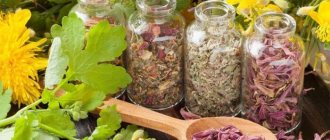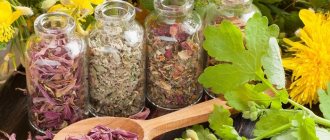Medicinal herbs for high stomach acidity
Medicinal plants are used during exacerbation of the disease and to prevent gastrointestinal pathologies (for example, pancreatitis). Infusions and decoctions of which herbs are allowed to drink for hyperacid gastritis?
Traditional medicine allows the use of herbs for the following symptoms of pathology:
- burning sensation in the mouth;
- pain of varying degrees of intensity in the abdomen and stomach;
- disorder of the emptying process - diarrhea or constipation;
- severe sour heartburn;
- belching.
The list of useful herbs used to treat gastritis includes: yarrow, fireweed, mint, plantain, celandine, calendula, St. John's wort, wormwood and others.
For mild forms of the disease, it is recommended to use one-component decoctions and infusions. During the acute stage, it is better to use preparations, as they have a stronger therapeutic effect.
Aloe
The juice of the plant exhibits an astringent, regenerating and antibacterial effect on the gastrointestinal mucosa, while at the same time helping to improve metabolism and cleanse the intestines.
Aloe juice or pulp is used for treatment for at least three years. To prepare the plant for use, it is necessary to keep the cut leaves in the cold (preferably in the refrigerator).
Pure aloe juice can be used for therapy. It is recommended to consume it several teaspoons twice a day, half an hour before meals for several months.
Another recipe suggests mixing the juice of the plant (you can crush the pulp of the leaves) with natural honey in equal parts and let it brew - this helps well against flatulence and increased gas formation.
This therapy can be accompanied by taking freshly squeezed potato juice, which helps reduce acid synthesis in the stomach if consumed on an empty stomach. As an option, you can mix potato juice, honey, aloe juice in the following proportions: honey and aloe juice 2 tbsp. spoons, potato juice - 1 glass, and take this remedy on an empty stomach in the morning.
Contraindications to taking aloe:
- allergies to bee products and aloe;
- oncology;
- high blood pressure;
- exacerbation of liver and bladder diseases;
- pregnancy.
It is advisable to accompany aloe treatment with the use of probiotics.
Chamomile
An infusion from it is made in a simple way: 1 teaspoon of chamomile is infused in a glass of boiling water for 3 hours, consumed warm, a third of a glass at a time for one day. It is also useful to use multi-component infusions with chamomile. Pregnant women and people with allergies should use chamomile infusion with caution.
Calendula
Marigold, or calendula, is often used for gastritis with high acidity because of its antibacterial, astringent, emollient, anti-inflammatory, regenerating and antispasmodic properties.
The infusion is prepared as follows: take 1 teaspoon of calendula (its flowers) and brew with boiling water (1 glass). For the decoction, take marigolds (1 tablespoon), add 0.5 liters of water and boil for 5 minutes. These drugs are used up to three times a day to prevent various exacerbations.
Calendula is also used as part of preparations. For example, a herbal gastric mixture for gastritis using calendula includes herbs such as yarrow, chamomile, marshmallow root. Take an infusion of these herbs half an hour before meals for 3 weeks.
Wormwood for gastritis with high acidity
This herb promotes the healing of ulcers on the mucous membrane, relieves inflammation, and also normalizes stool for constipation (wormwood has a mild laxative effect).
To prepare “wormwood tea,” take 2 teaspoons of fresh or dry herbs and brew with 1 liter of boiling water, leave for half an hour. Drink tea before meals, a quarter or a third of a glass three times a day.
Contraindications: pregnancy and breastfeeding, acute period of the disease, ulcerative lesions of the gastrointestinal tract, thrombophlebitis, severe neuropsychiatric diseases and alcoholism.
St. John's wort
This plant has anti-inflammatory and antibacterial properties. To prepare the infusion 1 tbsp. pour boiling water (1 cup) over a spoonful of herbs and let it brew for 20 minutes. Use 1 tbsp. spoon after eating.
Contraindications: pregnancy, taking antidepressants, hypertension and illnesses accompanied by high fever.
Use drugs with this herb with caution when simultaneous use of cardiac, painkillers and antiplatelet drugs. Consumption of St. John's wort significantly increases the skin's sensitivity to the sun, which can cause sunburn.
Ivan tea for gastritis with high acidity
Ivan tea (or narrow-leaved fireweed), due to its high anti-inflammatory and antispasmodic properties, has a positive effect on the damaged organ.
To prepare a decoction of fireweed tea, its leaves (15 g) are brewed with 1 glass of hot water. The broth is kept for 20 minutes in a water bath. It is recommended to take 3 times a day, 1 tbsp. spoon.
A good effect is obtained by alternately taking an infusion of fireweed tea (4 days) and comfrey (2 days). To prepare comfrey infusion, use 2 tbsp. Pour boiling water (200 ml) over spoons of plant root.
The combination of fireweed with yarrow, chamomile, cudweed, calendula and other herbs has an anti-inflammatory and wound-healing effect.
An overdose of this herb can cause diarrhea and insomnia.
Celandine
The use of this plant, due to its toxicity, requires special attention - the dosage and method of application are strictly observed. To increase acidity, use a tincture of alcohol, and to decrease it, use a tincture of water.
An infusion to reduce acidity is prepared as follows: take celandine, chamomile, St. John's wort and yarrow in a ratio of 1:1:3:2, brew with boiling water and infuse for several hours, drink on an empty stomach in the morning. Single dosage – half a glass, duration of therapy – 3 weeks.
Contraindications include: bronchial asthma, epilepsy, pregnancy.
Peppermint
Mint for gastritis helps relieve heartburn. Usually this plant is used as part of a mixture: a mixture of St. John's wort (30 g), yarrow, mint (15 g each), a pinch of bean, pour boiling water (2 cups), keep warm for several hours and drink throughout the day.
Another infusion: take mint, yarrow and dill seeds 15 g each, add St. John's wort (3 g) and watch leaves (2 g). For one serving of infusion, pour 2 teaspoons of the mixture into 2 glasses of hot water and leave for several hours. Drink a quarter glass at a time up to six times a day.
Contraindication: hypotension. An overdose of herbs can cause exacerbation of existing diseases.
Melissa
Melissa is good for the stomach due to its anti-inflammatory and antibacterial properties.
For infusion, pour 10 g of herb with boiling water (0.5 l). Leave for 20-25 minutes. For a decoction - 1 teaspoon of lemon balm per 0.5 liters of water, boil the mixture for a quarter of an hour and leave for about 30 minutes. Drink the decoction only freshly prepared during the day.
To prepare medicinal tea, take 1 teaspoon of lemon balm, chamomile and mint, pour 1 glass of boiling water, leave for half an hour. Drink tea during or after meals; it is allowed to sweeten with honey.
Milk thistle
Milk thistle has a healing effect on the liver, but it is no less useful for gastrointestinal diseases, for example, gastritis and pancreatitis. This plant helps heal wounds on the mucous membrane of the organ, relieves inflammation and spasms, reduces the concentration of cholesterol in the blood and helps normalize the production of bile.
The leaves and fruits of milk thistle are considered beneficial. Decoctions are prepared from them, which are effective for hyperacid gastritis.
Milk thistle oil can also be included in the diet as a means of protecting the stomach lining. It is used for medicinal purposes for about 2 months, enhancing the effects of the medications used.
Motherwort
Fresh motherwort juice is considered an excellent antispasmodic, which reduces pain during attacks of acute gastritis. You should drink it half an hour before meals, 1 teaspoon three times a day, with water.
To improve digestion, normalize acid concentration and reduce heaviness in the stomach, it is recommended to use an infusion of motherwort, for the preparation of which 2 teaspoons of the herb are poured into 2 cups of boiling water and allowed to brew for about 6 hours. You should drink the infusion a quarter of a glass half an hour before meals 3-4 times a day.
Contraindications: hypotension, allergy to motherwort.
Golden mustache
Preparations made from golden mustache relieve pain in the stomach, inflammation and irritation of the mucous membrane, and stabilize acidity.
To make a decoction, a leaf of an adult plant is poured with 3.5 cups of boiling water and simmered over low heat for about a quarter of an hour. Drink the infusion 3 times a day, half an hour before meals, for 10 days.
The medicine can negatively affect the condition of the vocal cords.
Sage, nettle, yarrow
With increased acidity, sage can be used as part of herbal preparations, along with mint and dill seeds. The plant has anti-inflammatory, antiseptic, antimicrobial and astringent properties.
Nettle contains many vitamins and minerals; the herb helps reduce the concentration of acid in the stomach. Decoctions of both fresh and dry leaves are used.
Yarrow stimulates the flow of bile and stops bleeding, relieves spasms. But with high acidity, this herb can only be taken as part of a preparation; side effects include dizziness and various rashes.
Wormwood for gastritis
The healing properties of wormwood have long been used in folk medicine to normalize the functioning of the gastrointestinal tract, especially for gastritis with low acidity. Wormwood is included in gastric drops, appetizing and choleretic preparations. Essential oil is used as a choleretic agent, improving digestive function.
Wormwood essential oil has choleretic properties and promotes the secretion of bile from the liver, which, in turn, normalizes digestion and helps neutralize excess acid in the stomach. In addition, the oil stimulates the production and secretion of not only bile, but also other digestive juices in the stomach, which also improves digestion.
Recipes with wormwood for gastritis:
- for gastritis with low acidity: pour 2 cups of boiling water into 1 teaspoon of wormwood herb. Leave for 20 minutes. Strain. Take half a glass 3 times a day half an hour before meals;
- collection for chronic gastritis: mix wormwood herb (4 parts) and yarrow herb (1 part). Pour a tablespoon of the mixture into a glass of boiling water, leave for 30 minutes and strain. Take a tablespoon 3-4 times a day for chronic gastritis with secretory insufficiency;
- infusion of wormwood for diarrhea: pour one tablespoon of herb into 0.5 liters of boiling water. Leave for 10 minutes. Drink 200 g immediately and the rest when it cools down;
- to improve appetite during gastritis: grind and mix 8 parts of wormwood with 2 parts of yarrow. Brew 1 teaspoon of the resulting mixture with 2 cups of boiling water. After infusion for 1 hour, take 1/4 cup three times a day;
- wormwood tea for gastritis: 1 teaspoon of finely chopped wormwood, pour 0.5 liters of boiling water in a teapot, let it brew for 20 minutes and drink 1/4 cup 3 times a day 30 minutes before meals for the same indications as wormwood infusion .
Wormwood infusion for gastritis
You can prepare wormwood tincture with water, alcohol or vodka. After pouring two tablespoons of wormwood into a glass of boiling water, boil the wormwood for about 15 minutes in a water bath. After cooling, the infusion is filtered.
You can prepare a tincture of wormwood for gastritis using water, alcohol or vodka.
After squeezing out the raw materials, bring the volume to 200 ml. Use also as a decoction. A water tincture of wormwood is indicated for the consequences of poor nutrition, accompanied by stomach pain and gastritis.
Wormwood tincture can be prepared in the following way: boil one spoon of dry herb in 250 milliliters of water, then cool and strain. The chilled tincture should be taken before each main meal. Since the infusion is very bitter, it can be sweetened with honey or sugar. It is recommended to take the tincture for gastritis, anorexia, loss of strength, fever, flu, pneumonia, poisoning.
You can prepare an alcohol tincture from wormwood. In this case, 25 grams of crushed grass are poured with 120 milliliters of alcohol and kept for eight days. Before taking, one spoon of tincture should be mixed in 100 milliliters of water and taken a tablespoon three to four times a day.
Wormwood contraindications for gastritis
Large doses of wormwood or its long-term use (several months) are unacceptable, since it can cause a disorder of the nervous system, intoxication of the body and, as a result, kidney failure, which in some cases can end tragically. The course of treatment should not exceed 2 weeks, maximum a month, provided that you feel normal. After which you need to take a break for at least two weeks, and preferably a month or more.
Wormwood is contraindicated during pregnancy and during breastfeeding, enterocolitis, bleeding, anemia. It is undesirable to use it for stomach ulcers and gastritis with low acidity - it will lower it even more. With caution, or under the supervision of a doctor, asthmatics should take wormwood. People who are allergic to wormwood or individual intolerance should not use wormwood.
Sources:
- https://liktravy.ua/ru/useful/encyclopedia-of-herbs/polynu-girkogo-trava
- https://alternativa-za-vas.com/ru/index.php/clanak/article/gastrit-lecenije
- https://gastritinform.ru/web-kapiche.ru/447-polyn-lechebnye-svoystva.html
- https://zdorovo.ua/statya/polyntrava-gorkaya
- https://gastritinform.ru/05.rospotrebnadzor.ru/371/-/asset_publisher/m7XL/content/
- https://www.obozrevatel.com/health/health/lechim-gastrit-narodnyimi-metodami.htm
Other herbs
Not only flowers, leaves, fruits, but also roots and bark can have a healing effect.
Cinnamon
Cinnamon has an antibacterial effect and perfectly relieves inflammation, helps improve food digestion, prevents bloating, colic, and eliminates diarrhea.
It is consumed as an infusion or by eating 2 tbsp daily. spoons of natural honey, sprinkled with ground cinnamon.
For infusion, you need to brew 1 teaspoon of cinnamon with boiling water (2 cups) and leave for an hour. It is recommended to drink the infusion 4 times a day before meals. Drink half a glass at a time.
Contraindications: pregnancy (there is a risk of miscarriage), internal bleeding, hypersensitivity to spices.
Oak bark
For erosive gastritis, it is good to use oak bark. A decoction of oak bark relieves inflammation and swelling of the mucous membrane of the digestive organ, protects it from irritation and accelerates recovery processes.
For the decoction, add a handful of pre-crushed oak bark to 1 liter of water and boil for 10 minutes. Drink half a glass of the decoction half an hour before meals. Treatment may be accompanied by nausea.
Burdock root
For a decoction, take 1 teaspoon of the plant per 1 (for decoction) or 2 (for making an infusion) glasses of water. You should take the medications at least three times a day for a month.
Burdock
You can protect the mucous membrane from the influence of hydrochloric acid and help stabilize the stomach with the help of plant juice. The course of therapy is 1.5 months, during which half a tbsp is taken three times a day. spoons of plant juice. This plant has virtually no contraindications.
Liquorice root
The drug from licorice root has the ability to normalize stomach acidity. To prepare it, you need to pour 20 g of the root, previously crushed, with boiling water (1 glass) and keep it in a water bath for 20 minutes, leave for several hours, add 1 glass of boiled water to the decoction. You should drink 2 tbsp before meals. spoons. The duration of treatment is a month.
The juice is consumed by adding it (a few drops) to warm water (half a glass), in three warm doses throughout the day.
Licorice is contraindicated in pregnant women and patients with high blood pressure.
Flax seeds for the treatment of stomach ulcers
Flaxseed has many beneficial qualities that are important for the treatment of peptic ulcers: it controls the acidity of the gastric fluid, coats the walls of the digestive organ, improves metabolism, helps the stable functioning of the gastrointestinal tract, restores damage to epithelial tissue, contains lecithin, which helps enhance the positive medicinal effects on the body .
Flaxseed Recipe
Usually, a decoction is prepared from flax seeds, since upon contact with water, mucus appears, which protects the mucous membrane from the negative effects of the disease. 20 grams of flaxseed are poured into 400 ml of boiling water and left overnight. When morning comes, filter the infusion and drink 100 ml three times a day before meals. The duration of treatment is two weeks.
Gastric collection for gastritis with high acidity
Ready-made stomach preparations can be found in pharmacies, but you can prepare them yourself.
For gastritis with increased secretion, a collection that consists of equal parts of calendula, chamomile, fireweed, horsetail, immortelle, yarrow, lemon balm and nettle leaves, to which are added calamus root, corn silk, and plantain leaves, is considered effective.
For acute gastritis, a mixture of 4 components is used: chamomile, string, calendula, yarrow, which relieve muscle spasms, heartburn and nausea. To prepare the infusion 2 tbsp. Pour boiling water (0.5 l) over spoons of the mixture and leave for 20 minutes. You should drink 150 ml of the product throughout the day.
Is it possible to use wormwood for gastritis?
It has been noticed that all preparations from the plant enhance the functioning of the digestive tract. They are used in the treatment of gastritis, colitis, hemorrhoids, and also to increase appetite. Wormwood is recommended for chronic gastritis. It stimulates the secretion of gastric enzymes and increases the speed of food digestion.
Wormwood is the most useful herb for stomach problems, despite its strong bitterness. It eliminates any stomach problems very quickly. A decoction of wormwood is an excellent remedy for cramps in the stomach and intestines, catarrhal gastritis, constipation, diarrhea, high acidity in the stomach, a feeling of fullness and pain in the stomach.
Drink one to two glasses of wormwood infusion per day and treat for a maximum of one week. Pour hot water over a teaspoon of herb and leave for ten minutes, then strain the mixture and drink it. But if you have high stomach acidity, wormwood is not recommended.
Alcohol tincture of wormwood (1:5) is taken 15–20 drops 3 times a day 20 minutes before meals. Thick wormwood extract is taken 10–20 drops, diluted in a small amount of water, half an hour before meals 3 times a day. Wormwood powder is taken 2-3 grams 3-4 times a day half an hour before meals.
Wormwood for gastritis with low acidity
Wormwood stimulates appetite and stimulates digestion: it is used for gastritis with low acidity, diseases of the biliary tract, pancreas, and colitis. Pour two tablespoons of crushed wormwood into a thermos with boiling water (0.5 liters), leave for 1-2 hours, strain and drink 1/4 cup 3-4 times a day 20-30 minutes before meals. Just like the infusion, they use wormwood tea: pour 1 teaspoon of finely chopped wormwood into a teapot with 0.5 liters of boiling water, let it brew for 20 minutes and drink 1/4 cup 3 times a day 30 minutes before meals.
Herbs that are prohibited
For hyperacid gastritis, the following are prohibited:
- rose hip. Rose hips have an irritating effect on the gastrointestinal mucosa;
- ginger. It provokes increased secretion and pain in the stomach;
- tsikoii. It causes increased synthesis of gastric juice, which is good with low acidity, but harmful with high acidity;
- sea buckthorn - irritates the gastric mucosa and increases acidity. The following can be beneficial for this type of gastritis: sea buckthorn oil or an infusion of its berries, which have anti-inflammatory and wound-healing properties;
- plantain. A decoction or juice from it can cause an exacerbation of the disease, especially if erosions or ulcers are present on the mucous membrane of the organ;
- calamus rhizome. Medicines made from calamus have a choleretic effect and increase the acidity of the stomach.
Treating the stomach with herbs
Now let's look at a few folk recipes that will help in the treatment of gastric diseases.
Sweet clover tincture for gastritis
This remedy will help improve the microflora in the stomach and intestines, relieve inflammation and pain. It is prepared from sweet clover grass according to the following recipe:
- chop dried plants;
- 1 tsp. pour sweet clover powder into a jar;
- pour a glass of vodka;
- put it in a dark place;
- leave for 2 weeks, shaking occasionally;
- strain.
The product should be taken twice a day, 1 tsp.
Bergenia tincture for peptic ulcers
This folk remedy treats ulcers not only of the stomach, but also of the duodenum. How to prepare such a tincture? Follow the simple recipe.
- Grate 30 g of propolis on a fine grater;
- add chopped bergenia root (1 tbsp) to it;
- fill with vodka (0.5 l);
- place carefully;
- leave for one week at room temperature.
Take this medicine for 3 weeks according to the following regimen: 1 tsp. Dissolve the tinctures in a small amount of water (20 ml) and drink before meals. The tincture should be taken 3 times a day.
Remember that the health of the stomach affects the degree of absorption of nutrients, and, consequently, the condition of the skin and overall well-being. Medicinal herbs will help you not only improve digestion, but also cope with diseases! Be healthy!
Side effects
Side effects from using herbs include:
- increased blood pressure;
- swelling of various parts of the body;
- constriction of blood vessels (when using preparations from yarrow);
- exacerbation of varicose veins;
- the occurrence of hallucinations (when using wormwood tinctures);
- convulsions.
To prevent such phenomena, it is important to correctly select the dosage of herbs. Excess active ingredients can lead to intoxication of the body and other unpleasant symptoms.
List of references: https://www.obozrevatel.com/health/health/lechim-gastrit-narodnyimi-metodami.htm https://liktravy.ua/ru/useful/articles/likuvannia-hastrytu-travamy komikz.ru/news /society/10714 https://aif.ru/health/life/1477307 https://nastroenie.tv/episode/110075 https://sobesednik.ru/zdorove/lechim-gastrit-narodnymi-sredstvami https://www .bibliotekar.ru/med/med3-1.htm https://artlib.osu.ru/Docs/piter/bookchap/978546901571.html https://www.kp.ru/guide/kislotnost-zheludka.html https: //azbyka.ru/zdorovie/travnik-terapiya-zabolevanij-zheludka Home medical encyclopedia. Symptoms and treatment of the most common diseases. T. N. Albova, 2010. Notes from the author of the article, based on personal experience. This material is purely subjective and is not a guide to action. Only a qualified specialist can determine an accurate diagnosis and prescribe treatment.
Last modified: 03/13/2020










